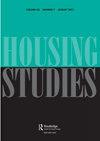Women’s life course and precarious housing in older age: an Australian qualitative study
IF 2.9
2区 经济学
Q3 ENVIRONMENTAL STUDIES
引用次数: 0
Abstract
With increasing numbers of older Australian women facing housing precarity, it is essential to understand how this social problem persists and grows despite structural change with greater participation of women in employment and education, and greater societal recognition of their rights. We drew on a life course framework to consider the interaction of personal and societal conditions to understand how older women come to be precariously housed in older age. Life history interviews with 30 older women who accessed social housing due to housing precarity were completed. The qualitative analysis identified three groups: women who were lifelong renters by choice and then struggled with private rental costs on a pension in older age; women who carried into older age accumulated disadvantage over their lives; and women who lost home ownership despite initial advantages in education, employment, and assets. Although events such as ill health can have a longstanding impact on women’s lives and housing security, it is the interaction of multiple structural and personal circumstances across the life course that result in later life housing precarity. The impact of violence including the striking effect of economic abuse on women’s housing pathways was a dominant finding in our study.老年妇女的生命历程和不稳定的住房:澳大利亚的一项定性研究
随着越来越多的澳大利亚老年妇女面临住房不稳定问题,有必要了解,尽管发生了结构性变化,妇女更多地参与就业和教育,社会对她们的权利有了更大的认识,但这一社会问题是如何持续存在和增长的。我们利用生命历程框架来考虑个人和社会条件的相互作用,以了解老年妇女是如何在老年时期不稳定地居住的。完成了对30名因住房不稳定而获得社会住房的老年妇女的生活史访谈。定性分析确定了三种人群:一种是选择终身租房的女性,后来在老年时因私人租房成本而挣扎;进入老年的妇女在一生中积累了不利条件;还有那些尽管在教育、就业和资产方面拥有最初的优势,但却失去了房屋所有权的女性。尽管健康状况不佳等事件可能对妇女的生活和住房保障产生长期影响,但在整个生命过程中,多种结构和个人情况的相互作用导致晚年住房不稳定。暴力的影响,包括经济虐待对妇女住房途径的显著影响,是我们研究的主要发现。
本文章由计算机程序翻译,如有差异,请以英文原文为准。
求助全文
约1分钟内获得全文
求助全文
来源期刊

HOUSING STUDIES
Multiple-
CiteScore
7.10
自引率
18.80%
发文量
100
期刊介绍:
Housing Studies is the essential international forum for academic debate in the housing field. Since its establishment in 1986, Housing Studies has become the leading housing journal and has played a major role in theoretical and analytical developments within this area of study. The journal has explored a range of academic and policy concerns including the following: •linkages between housing and other areas of social and economic policy •the role of housing in everyday life and in gender, class and age relationships •the economics of housing expenditure and housing finance •international comparisons and developments •issues of sustainability and housing development
 求助内容:
求助内容: 应助结果提醒方式:
应助结果提醒方式:


